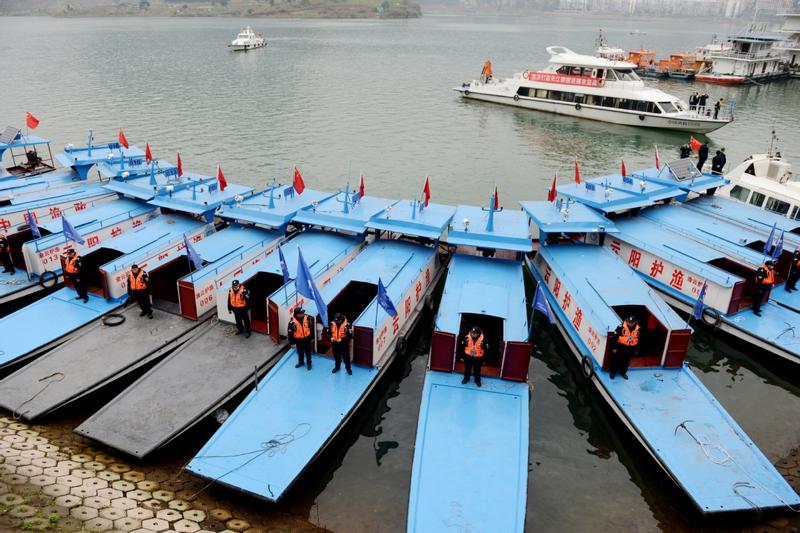 Boats carrying rangers prepare to leave a dock on a tributary of the Yangtze River in Yunyang county, Chongqing, on Dec 31, 2020 for a mission to enforce a fishing moratorium in the Yangtze. (LIU YANG / FOR CHINA DAILY)
Boats carrying rangers prepare to leave a dock on a tributary of the Yangtze River in Yunyang county, Chongqing, on Dec 31, 2020 for a mission to enforce a fishing moratorium in the Yangtze. (LIU YANG / FOR CHINA DAILY)
A 10-year fishing moratorium in all natural waterways of the Yangtze River, including its major tributaries and lakes, came into effect on Friday.
The crackdown on illegal fishing should be enhanced to ensure effective implementation of the ban, Vice-Premier Hu Chunhua said at the launch ceremony of the moratorium in Wuhan, capital of Hubei province, on Thursday.
Local governments in the basin and related government bodies should work together to implement the ban, which he said was "a key measure" to reverse the degradation of the Yangtze's ecosystem.
He also emphasized resettling former fishermen and pushing for a total ban on the sale and consumption of wild fish from the river.
Vice-Premier Hu Chunhua said the ban is "a key measure" to reverse the degradation of the Yangtze's ecosystem
READ MORE: Chinese vice premier stresses Yangtze River fishing ban
In January 2020, China implemented a full fishing ban in 332 conservation areas in the Yangtze basin. The ban has since been expanded.
According to the Ministry of Public Security, police have solved more than 4,700 criminal cases related to illegal fishing in the Yangtze River, and have arrested over 6,900 suspects.
More than 3,900 fishing boats and 45,000 items of fishing equipment have been seized in a series of crackdowns on illegal fishing in the Yangtze since July, it said.
Minister of Agriculture and Rural Affairs Tang Renjian said more than 110,000 fishing boats along the Yangtze River have been decommissioned.
ALSO READ: Xi praises Yangtze protection
He added that nearly 228,000 people have left the fishing industry. Of those, 165,000 have found new jobs and at least one member of each family previously engaged in fishing is currently employed.
In addition, 218,000 of the fishermen involved are covered by the social security system.
Wang Mingwu, whose family had been fishing for generations, had been concerned about his livelihood before the fishing ban was imposed in Wuhan on July 1.
But thanks to support from the local government, he found a new job as a ranger working to enforce the moratorium.
He said that fish stocks in the river were getting increasingly depleted. The catch he got using a small wooden boat used to be enough to support his entire family.
However, in recent years, despite using a much larger boat with an engine, the catch was much smaller.
"There were fewer and fewer fish in the Yangtze. The size of them was also getting smaller," he said.
READ MORE: 4,838 illegal fishing suspects captured along Yangtze
His family received a total of 117,000 yuan (US$17,936) in compensation for their fishing equipment, and he and his wife were given social security subsidies of over 70,000 yuan. In addition, he has an annual income of over 30,000 yuan from his work as a ranger.
"The fishing ban is a good thing. We will educate the future generations to join the efforts to protect our mother river," he said.


